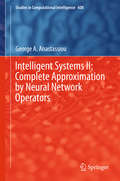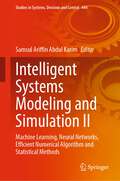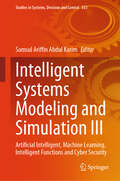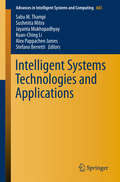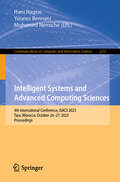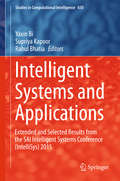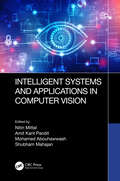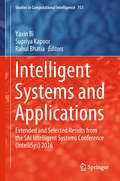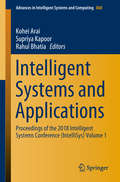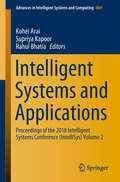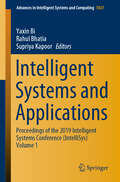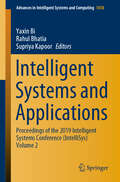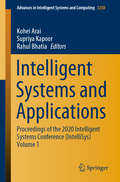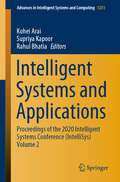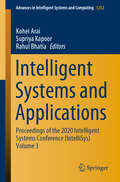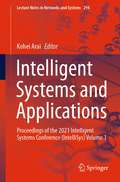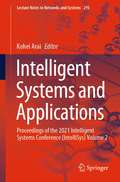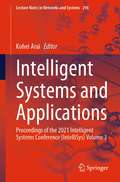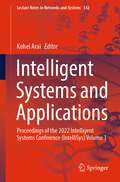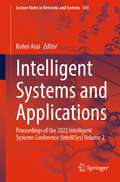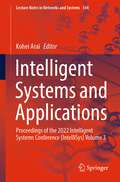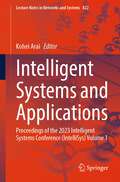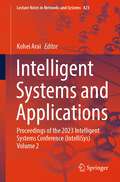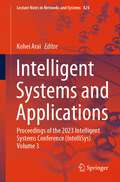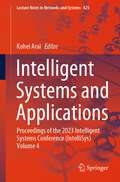- Table View
- List View
Intelligent Systems II: Complete Approximation by Neural Network Operators
by George A. AnastassiouThis monograph is the continuation and completion of the monograph, "Intelligent Systems: Approximation by Artificial Neural Networks" written by the same author and published 2011 by Springer. The book you hold in hand presents the complete recent and original work of the author in approximation by neural networks. Chapters are written in a self-contained style and can be read independently. Advanced courses and seminars can be taught out of this brief book. All necessary background and motivations are given per chapter. A related list of references is given also per chapter. The book's results are expected to find applications in many areas of applied mathematics, computer science and engineering. As such this monograph is suitable for researchers, graduate students, and seminars of the above subjects, also for all science and engineering libraries.
Intelligent Systems Modeling and Simulation II: Machine Learning, Neural Networks, Efficient Numerical Algorithm and Statistical Methods (Studies in Systems, Decision and Control #444)
by Samsul Ariffin Abdul KarimThis book develops a new system of modeling and simulations based on intelligence system. As we are directly moving from Third Industrial Revolution (IR3.0) to Fourth Industrial Revolution (IR4.0), there are many emergence techniques and algorithm that appear in many sciences and engineering branches. Nowadays, most industries are using IR4.0 in their product development as well as to refine their products. These include simulation on oil rig drilling, big data analytics on consumer analytics, fastest algorithm for large-scale numerical simulations and many more. These will save millions of dollar in the operating costs. Without any doubt, mathematics, statistics and computing are well blended to form an intelligent system for simulation and modeling. Motivated by this rapid development, in this book, a total of 41 chapters are contributed by the respective experts. The main scope of the book is to develop a new system of modeling and simulations based on machine learning, neural networks, efficient numerical algorithm and statistical methods. This book is highly suitable for postgraduate students, researchers as well as scientists that have interest in intelligent numerical modeling and simulations.
Intelligent Systems Modeling and Simulation III: Artificial Intelligent, Machine Learning, Intelligent Functions and Cyber Security (Studies in Systems, Decision and Control #553)
by Samsul Ariffin Abdul KarimThis book continues the previous edition: Samsul Ariffin Abdul Karim (2022). Intelligent Systems Modeling and Simulation II: Machine Learning, Neural Networks, Efficient Numerical Algorithm and Statistical Methods, Studies in Systems, Decision and Control (SSDC, volume 444, 22k Access). After two years, Intelligent Systems Modeling and Simulation have evolved tremendously through the latest and advanced emergence technologies and many highly sophisticated algorithms have been developed by blending artificial intelligence (AI) and mathematics, statistics, data modelling and other related research areas. These blends offer many opportunities and further investigations into the overlapand equality between these areas. It is a well-known fact that most industries and companies have utilized this IR4.0 architecture in various levels of manufacturing and decision processes. Besides, nowadays IR5.0 or Society5.0 has also been embedded into various systems in industries as well as in Teaching and Learning (TL). The combination of IR4.0 and Society 5.0 may result in more impactful outcomes, especially in automated decision-making and reliable simulations-based modelling. Furthermore, IR4.0 and Society5.0 through Data-Driven have made a significant contribution to the government and companies to analyse big data via predictive analytics. Cyber security firewalls on all systems must be up to date to prevent any malicious attacks by hackers. Otherwise, our citizens might be scammed and according to NBC News, the total loss for 2022 is around USD 8.8 billion. These are very huge amount. Just recently, COVID-19 has been spreading all over the world again. To assist the Ministry of Health (MOH) and other government agencies, it is very crucial to identify, predict, detect and quarantine the COVID-19 on the susceptible persons soonest possible. Intelligent Image Processing techniques are very demanding here. This is to ensure that we can control and minimise the spread. Inspire by these latest developments, in this book, various experts in the areas of Artificial Intelligence, Machine Learning, Deep Learning, Neural Networks, Modeling and Simulation, Cyber Security and Awareness, Intelligent Statistical Methods, Big Data Analytics, Sentiment Analytics, Intelligent Function Approximation, Image Processing in medical imaging especially on COVID-19, AI in Teaching and Learning, and Computational Intelligence will share their latest studies and experiences. Their finding is in line with United Nations Sustainable Development Goals (SDGs) such as No. 9: Industry, Innovation, and Infrastructure, particularly Target 9.4, 9.5, 9.a, 9.b and 9.c, No. 11: Sustainable Cities and Communities particularly Target 11.b and Indicators 11.b.1 and 11.b.2, and SDG No. 4: Quality Education; particularly Target 4.7 and Indicator 4.7.1. This book is highly suitable for postgraduate students and researchers to get the state-of-the-art current research directions as well as for the scientists that have an interest and working in intelligent numerical modelling and simulations through AI, Machine Learning, Neural Networks, and its related counterparts.
Intelligent Systems Technologies and Applications: Volume 2 (Advances In Intelligent Systems And Computing #385)
by Kuan-Ching Li Sushmita Mitra Sabu M. Thampi Jayanta Mukhopadhyay Alex Pappachen James Stefano BerrettiThis book constitutes the thoroughly refereed post-conference proceedings of the third International Symposium on Intelligent Systems Technologies and Applications (ISTA'17), September 13-16, 2017, Manipal, Karnataka, India. All submissions were evaluated on the basis of their significance, novelty, and technical quality. This proceedings contains 34 papers selected for presentation at the Symposium.
Intelligent Systems and Advanced Computing Sciences: 4th International Conference, ISACS 2023, Taza, Morocco, October 26–27, 2023, Proceedings (Communications in Computer and Information Science #2255)
by Hani Hagras Mohamed Nemiche Younes BennaniThis book constitutes revised selected papers from the thoroughly refereed conference proceedings of the 4th International Conference on Intelligent Systems and Advanced Computing Sciences, ISACS 2023, which took place in Taza, Morocco, in October 26–27, 2023. The 30 full papers and 8 short papers presented in these proceedings were carefully reviewed and selected from 131 submissions. This conference focusing on all theoretical and practical aspects related to information technology and communications security.
Intelligent Systems and Applications
by Supriya Kapoor Rahul Bhatia Yaxin BiThis book is a remarkablecollection of chapters covering a wider range of topics, including unsupervisedtext mining, anomaly and Intrusion Detection, Self-reconfiguring Robotics,application of Fuzzy Logic to development aid, Design and Optimization, Context-AwareReasoning, DNA Sequence Assembly and Multilayer Perceptron Networks. Thetwenty-one chapters present extended results from the SAI Intelligent SystemsConference (IntelliSys) 2015 and have been selected based on highrecommendations during IntelliSys 2015 review process. This book presentsinnovative research and development carried out presently in fields ofknowledge representation and reasoning, machine learning, and particularly inintelligent systems in a more broad sense. It provides state - of - the - artintelligent methods and techniques for solving real world problems along with avision of the future research.
Intelligent Systems and Applications in Computer Vision
by Mohamed Abouhawwash Nitin Mittal Shubham Mahajan Amit Kant PanditThe book comprehensively covers a wide range of evolutionary computer vision methods and applications, feature selection and extraction for training and classification, and metaheuristic algorithms in image processing. It further discusses optimized image segmentation, its analysis, pattern recognition, and object detection. Features: Discusses machine learning-based analytics such as GAN networks, autoencoders, computational imaging, and quantum computing. Covers deep learning algorithms in computer vision. Showcases novel solutions such as multi-resolution analysis in imaging processing, and metaheuristic algorithms for tackling challenges associated with image processing. Highlight optimization problems such as image segmentation and minimized feature design vector. Presents platform and simulation tools for image processing and segmentation. The book aims to get the readers familiar with the fundamentals of computational intelligence as well as the recent advancements in related technologies like smart applications of digital images, and other enabling technologies from the context of image processing and computer vision. It further covers important topics such as image watermarking, steganography, morphological processing, and optimized image segmentation. It will serve as an ideal reference text for senior undergraduate, graduate students, and academic researchers in fields including electrical engineering, electronics, communications engineering, and computer engineering.
Intelligent Systems and Applications: Extended And Selected Results From The Sai Intelligent Systems Conference (intellisys) 2015 (Studies In Computational Intelligence #650)
by Supriya Kapoor Rahul Bhatia Yaxin BiThis book is a remarkable collection of chapters covering a wider range of topics, including unsupervised text mining, anomaly and Intrusion Detection, Self-reconfiguring Robotics, application of Fuzzy Logic to development aid, Design and Optimization, Context-Aware Reasoning, DNA Sequence Assembly and Multilayer Perceptron Networks. The twenty-one chapters present extended results from the SAI Intelligent Systems Conference (IntelliSys) 2015 and have been selected based on high recommendations during IntelliSys 2015 review process. This book presents innovative research and development carried out presently in fields of knowledge representation and reasoning, machine learning, and particularly in intelligent systems in a more broad sense. It provides state - of - the - art intelligent methods and techniques for solving real world problems along with a vision of the future research.
Intelligent Systems and Applications: Proceedings of the 2018 Intelligent Systems Conference (IntelliSys) Volume 1 (Advances in Intelligent Systems and Computing #868)
by Kohei Arai Supriya Kapoor Rahul BhatiaGathering the Proceedings of the 2018 Intelligent Systems Conference (IntelliSys 2018), this book offers a remarkable collection of chapters covering a wide range of topics in intelligent systems and computing, and their real-world applications. The Conference attracted a total of 568 submissions from pioneering researchers, scientists, industrial engineers, and students from all around the world. These submissions underwent a double-blind peer review process, after which 194 (including 13 poster papers) were selected to be included in these proceedings. As intelligent systems continue to replace and sometimes outperform human intelligence in decision-making processes, they have made it possible to tackle many problems more effectively. This branching out of computational intelligence in several directions, and the use of intelligent systems in everyday applications, have created the need for such an international conference, which serves as a venue for reporting on cutting-edge innovations and developments. This book collects both theory and application-based chapters on all aspects of artificial intelligence, from classical to intelligent scope. Readers are sure to find the book both interesting and valuable, as it presents state-of-the-art intelligent methods and techniques for solving real-world problems, along with a vision of future research directions.
Intelligent Systems and Applications: Proceedings of the 2018 Intelligent Systems Conference (IntelliSys) Volume 2 (Advances in Intelligent Systems and Computing #869)
by Kohei Arai Supriya Kapoor Rahul BhatiaGathering the Proceedings of the 2018 Intelligent Systems Conference (IntelliSys 2018), this book offers a remarkable collection of chapters covering a wide range of topics in intelligent systems and computing, and their real-world applications. The Conference attracted a total of 568 submissions from pioneering researchers, scientists, industrial engineers, and students from all around the world. These submissions underwent a double-blind peer review process, after which 194 (including 13 poster papers) were selected to be included in these proceedings. As intelligent systems continue to replace and sometimes outperform human intelligence in decision-making processes, they have made it possible to tackle many problems more effectively. This branching out of computational intelligence in several directions, and the use of intelligent systems in everyday applications, have created the need for such an international conference, which serves as a venue for reporting on cutting-edge innovations and developments. This book collects both theory and application-based chapters on all aspects of artificial intelligence, from classical to intelligent scope. Readers are sure to find the book both interesting and valuable, as it presents state-of-the-art intelligent methods and techniques for solving real-world problems, along with a vision of future research directions.
Intelligent Systems and Applications: Proceedings of the 2019 Intelligent Systems Conference (IntelliSys) Volume 1 (Advances in Intelligent Systems and Computing #1037)
by Supriya Kapoor Rahul Bhatia Yaxin BiThe book presents a remarkable collection of chapters covering a wide range of topics in the areas of intelligent systems and artificial intelligence, and their real-world applications. It gathers the proceedings of the Intelligent Systems Conference 2019, which attracted a total of 546 submissions from pioneering researchers, scientists, industrial engineers, and students from all around the world. These submissions underwent a double-blind peer-review process, after which 190 were selected for inclusion in these proceedings.As intelligent systems continue to replace and sometimes outperform human intelligence in decision-making processes, they have made it possible to tackle a host of problems more effectively. This branching out of computational intelligence in several directions and use of intelligent systems in everyday applications have created the need for an international conference as a venue for reporting on the latest innovations and trends.This book collects both theory and application based chapters on virtually all aspects of artificial intelligence; presenting state-of-the-art intelligent methods and techniques for solving real-world problems, along with a vision for future research, it represents a unique and valuable asset.
Intelligent Systems and Applications: Proceedings of the 2019 Intelligent Systems Conference (IntelliSys) Volume 2 (Advances in Intelligent Systems and Computing #1038)
by Supriya Kapoor Rahul Bhatia Yaxin BiThe book presents a remarkable collection of chapters covering a wide range of topics in the areas of intelligent systems and artificial intelligence, and their real-world applications. It gathers the proceedings of the Intelligent Systems Conference 2019, which attracted a total of 546 submissions from pioneering researchers, scientists, industrial engineers, and students from all around the world. These submissions underwent a double-blind peer-review process, after which 190 were selected for inclusion in these proceedings. As intelligent systems continue to replace and sometimes outperform human intelligence in decision-making processes, they have made it possible to tackle a host of problems more effectively. This branching out of computational intelligence in several directions and use of intelligent systems in everyday applications have created the need for an international conference as a venue for reporting on the latest innovations and trends. This book collects both theory and application based chapters on virtually all aspects of artificial intelligence; presenting state-of-the-art intelligent methods and techniques for solving real-world problems, along with a vision for future research, it represents a unique and valuable asset.
Intelligent Systems and Applications: Proceedings of the 2020 Intelligent Systems Conference (IntelliSys) Volume 1 (Advances in Intelligent Systems and Computing #1250)
by Kohei Arai Supriya Kapoor Rahul BhatiaThe book Intelligent Systems and Applications - Proceedings of the 2020 Intelligent Systems Conference is a remarkable collection of chapters covering a wider range of topics in areas of intelligent systems and artificial intelligence and their applications to the real world. The Conference attracted a total of 545 submissions from many academic pioneering researchers, scientists, industrial engineers, students from all around the world. These submissions underwent a double-blind peer review process. Of those 545 submissions, 177 submissions have been selected to be included in these proceedings. As intelligent systems continue to replace and sometimes outperform human intelligence in decision-making processes, they have enabled a larger number of problems to be tackled more effectively.This branching out of computational intelligence in several directions and use of intelligent systems in everyday applications have created the need for such an international conference which serves as a venue to report on up-to-the-minute innovations and developments. This book collects both theory and application based chapters on all aspects of artificial intelligence, from classical to intelligent scope. We hope that readers find the volume interesting and valuable; it provides the state of the art intelligent methods and techniques for solving real world problems along with a vision of the future research.
Intelligent Systems and Applications: Proceedings of the 2020 Intelligent Systems Conference (IntelliSys) Volume 2 (Advances in Intelligent Systems and Computing #1251)
by Kohei Arai Supriya Kapoor Rahul BhatiaThe book Intelligent Systems and Applications - Proceedings of the 2020 Intelligent Systems Conference is a remarkable collection of chapters covering a wider range of topics in areas of intelligent systems and artificial intelligence and their applications to the real world. The Conference attracted a total of 545 submissions from many academic pioneering researchers, scientists, industrial engineers, students from all around the world. These submissions underwent a double-blind peer review process. Of those 545 submissions, 177 submissions have been selected to be included in these proceedings. As intelligent systems continue to replace and sometimes outperform human intelligence in decision-making processes, they have enabled a larger number of problems to be tackled more effectively.This branching out of computational intelligence in several directions and use of intelligent systems in everyday applications have created the need for such an international conference which serves as a venue to report on up-to-the-minute innovations and developments. This book collects both theory and application based chapters on all aspects of artificial intelligence, from classical to intelligent scope. We hope that readers find the volume interesting and valuable; it provides the state of the art intelligent methods and techniques for solving real world problems along with a vision of the future research.
Intelligent Systems and Applications: Proceedings of the 2020 Intelligent Systems Conference (IntelliSys) Volume 3 (Advances in Intelligent Systems and Computing #1252)
by Kohei Arai Supriya Kapoor Rahul BhatiaThe book Intelligent Systems and Applications - Proceedings of the 2020 Intelligent Systems Conference is a remarkable collection of chapters covering a wider range of topics in areas of intelligent systems and artificial intelligence and their applications to the real world. The Conference attracted a total of 545 submissions from many academic pioneering researchers, scientists, industrial engineers, students from all around the world. These submissions underwent a double-blind peer review process. Of those 545 submissions, 177 submissions have been selected to be included in these proceedings.As intelligent systems continue to replace and sometimes outperform human intelligence in decision-making processes, they have enabled a larger number of problems to be tackled more effectively.This branching out of computational intelligence in several directions and use of intelligent systems in everyday applications have created the need for such an international conference which serves as a venue to report on up-to-the-minute innovations and developments.This book collects both theory and application based chapters on all aspects of artificial intelligence, from classical to intelligent scope.We hope that readers find the volume interesting and valuable; it provides the state of the art intelligent methods and techniques for solving real world problems along with a vision of the future research.
Intelligent Systems and Applications: Proceedings of the 2021 Intelligent Systems Conference (IntelliSys) Volume 1 (Lecture Notes in Networks and Systems #294)
by Kohei AraiThis book presents Proceedings of the 2021 Intelligent Systems Conference which is a remarkable collection of chapters covering a wider range of topics in areas of intelligent systems and artificial intelligence and their applications to the real world. The conference attracted a total of 496 submissions from many academic pioneering researchers, scientists, industrial engineers, and students from all around the world. These submissions underwent a double-blind peer-review process. Of the total submissions, 180 submissions have been selected to be included in these proceedings. As we witness exponential growth of computational intelligence in several directions and use of intelligent systems in everyday applications, this book is an ideal resource for reporting latest innovations and future of AI. The chapters include theory and application on all aspects of artificial intelligence, from classical to intelligent scope.We hope that readers find the book interesting and valuable; it provides the state-of-the-art intelligent methods and techniques for solving real-world problems along with a vision of the future research.
Intelligent Systems and Applications: Proceedings of the 2021 Intelligent Systems Conference (IntelliSys) Volume 2 (Lecture Notes in Networks and Systems #295)
by Kohei AraiThis book presents Proceedings of the 2021 Intelligent Systems Conference which is a remarkable collection of chapters covering a wider range of topics in areas of intelligent systems and artificial intelligence and their applications to the real world. The conference attracted a total of 496 submissions from many academic pioneering researchers, scientists, industrial engineers, and students from all around the world. These submissions underwent a double-blind peer-review process. Of the total submissions, 180 submissions have been selected to be included in these proceedings.As we witness exponential growth of computational intelligence in several directions and use of intelligent systems in everyday applications, this book is an ideal resource for reporting latest innovations and future of AI. The chapters include theory and application on all aspects of artificial intelligence, from classical to intelligent scope.We hope that readers find the book interesting and valuable; it provides the state-of-the-art intelligent methods and techniques for solving real-world problems along with a vision of the future research.
Intelligent Systems and Applications: Proceedings of the 2021 Intelligent Systems Conference (IntelliSys) Volume 3 (Lecture Notes in Networks and Systems #296)
by Kohei AraiThis book presents Proceedings of the 2021 Intelligent Systems Conference which is a remarkable collection of chapters covering a wider range of topics in areas of intelligent systems and artificial intelligence and their applications to the real world. The conference attracted a total of 496 submissions from many academic pioneering researchers, scientists, industrial engineers, and students from all around the world. These submissions underwent a double-blind peer-review process. Of the total submissions, 180 submissions have been selected to be included in these proceedings.As we witness exponential growth of computational intelligence in several directions and use of intelligent systems in everyday applications, this book is an ideal resource for reporting latest innovations and future of AI. The chapters include theory and application on all aspects of artificial intelligence, from classical to intelligent scope.We hope that readers find the book interesting and valuable; it provides the state-of-the-art intelligent methods and techniques for solving real-world problems along with a vision of the future research.
Intelligent Systems and Applications: Proceedings of the 2022 Intelligent Systems Conference (IntelliSys) Volume 1 (Lecture Notes in Networks and Systems #542)
by Kohei AraiThis book is a remarkable collection of chapters covering a wide domain of topics related to artificial intelligence and its applications to the real world. The conference attracted a total of 494 submissions from many academic pioneering researchers, scientists, industrial engineers, and students from all around the world. These submissions underwent a double-blind peer-reviewed process. Of the total submissions, 176 submissions have been selected to be included in these proceedings.It is difficult to imagine how artificial intelligence has become an inseparable part of our life. From mobile phones, smart watches, washing machines to smart homes, smart cars, and smart industries, artificial intelligence has helped to revolutionize the whole globe. As we witness exponential growth of computational intelligence in several directions and use of intelligent systems in everyday applications, this book is an ideal resource for reporting latest innovations and future of AI. Distinguished researchers have made valuable studies to understand the various bottlenecks existing in different arenas and how they can be overcome with the use of intelligent systems. This book also provides new directions and dimensions of future research work.We hope that readers find the volume interesting and valuable.
Intelligent Systems and Applications: Proceedings of the 2022 Intelligent Systems Conference (IntelliSys) Volume 2 (Lecture Notes in Networks and Systems #543)
by Kohei AraiThis book is a remarkable collection of chapters covering a wide domain of topics related to artificial intelligence and its applications to the real world. The conference attracted a total of 494 submissions from many academic pioneering researchers, scientists, industrial engineers, and students from all around the world. These submissions underwent a double-blind peer-reviewed process. Of the total submissions, 176 submissions have been selected to be included in these proceedings.It is difficult to imagine how artificial intelligence has become an inseparable part of our life. From mobile phones, smart watches, washing machines to smart homes, smart cars, and smart industries, artificial intelligence has helped to revolutionize the whole globe. As we witness exponential growth of computational intelligence in several directions and use of intelligent systems in everyday applications, this book is an ideal resource for reporting latest innovations and future of AI. Distinguished researchers have made valuable studies to understand the various bottlenecks existing in different arenas and how they can be overcome with the use of intelligent systems. This book also provides new directions and dimensions of future research work.We hope that readers find the volume interesting and valuable.
Intelligent Systems and Applications: Proceedings of the 2022 Intelligent Systems Conference (IntelliSys) Volume 3 (Lecture Notes in Networks and Systems #544)
by Kohei AraiThis book is a remarkable collection of chapters covering a wide domain of topics related to artificial intelligence and its applications to the real world. The conference attracted a total of 494 submissions from many academic pioneering researchers, scientists, industrial engineers, and students from all around the world. These submissions underwent a double-blind peer-reviewed process. Of the total submissions, 176 submissions have been selected to be included in these proceedings. It is difficult to imagine how artificial intelligence has become an inseparable part of our life. From mobile phones, smart watches, washing machines to smart homes, smart cars, and smart industries, artificial intelligence has helped to revolutionize the whole globe. As we witness exponential growth of computational intelligence in several directions and use of intelligent systems in everyday applications, this book is an ideal resource for reporting latest innovations and future of AI. Distinguished researchers have made valuable studies to understand the various bottlenecks existing in different arenas and how they can be overcome with the use of intelligent systems. This book also provides new directions and dimensions of future research work. We hope that readers find the volume interesting and valuable.
Intelligent Systems and Applications: Proceedings of the 2023 Intelligent Systems Conference (IntelliSys) Volume 1 (Lecture Notes in Networks and Systems #822)
by Kohei AraiThe book is a unique collection of studies involving intelligent systems and applications of artificial intelligence in the real world to provide solutions to most vexing problems. IntelliSys received an overwhelming 605 papers which were put under strict double-blind peer-review for their novelty, originality and exhaustive research. Finally, 227 papers were sieved and chosen to be published in the proceedings.This book is a valuable collection of all the latest research in the field of artificial intelligence and smart systems. It provides a ready-made resource to all the readers keen on gaining information regarding the latest trends in intelligent systems. It also renders a sneak peek into the future world governed by artificial intelligence.
Intelligent Systems and Applications: Proceedings of the 2023 Intelligent Systems Conference (IntelliSys) Volume 2 (Lecture Notes in Networks and Systems #823)
by Kohei AraiThe book is a unique collection of studies involving intelligent systems and applications of artificial intelligence in the real world to provide solutions to most vexing problems. IntelliSys received an overwhelming 605 papers which were put under strict double-blind peer-review for their novelty, originality and exhaustive research. Finally, 227 papers were sieved and chosen to be published in the proceedings.This book is a valuable collection of all the latest research in the field of artificial intelligence and smart systems. It provides a ready-made resource to all the readers keen on gaining information regarding the latest trends in intelligent systems. It also renders a sneak peek into the future world governed by artificial intelligence.
Intelligent Systems and Applications: Proceedings of the 2023 Intelligent Systems Conference (IntelliSys) Volume 3 (Lecture Notes in Networks and Systems #824)
by Kohei AraiThe book is a unique collection of studies involving intelligent systems and applications of artificial intelligence in the real world to provide solutions to most vexing problems. IntelliSys received an overwhelming 605 papers which were put under strict double-blind peer-review for their novelty, originality and exhaustive research. Finally, 227 papers were sieved and chosen to be published in the proceedings.This book is a valuable collection of all the latest research in the field of artificial intelligence and smart systems. It provides a ready-made resource to all the readers keen on gaining information regarding the latest trends in intelligent systems. It also renders a sneak peek into the future world governed by artificial intelligence.
Intelligent Systems and Applications: Proceedings of the 2023 Intelligent Systems Conference (IntelliSys) Volume 4 (Lecture Notes in Networks and Systems #825)
by Kohei AraiThe book is a unique collection of studies involving intelligent systems and applications of artificial intelligence in the real world to provide solutions to most vexing problems. IntelliSys received an overwhelming 605 papers which were put under strict double-blind peer-review for their novelty, originality and exhaustive research. Finally, 227 papers were sieved and chosen to be published in the proceedings.This book is a valuable collection of all the latest research in the field of artificial intelligence and smart systems. It provides a ready-made resource to all the readers keen on gaining information regarding the latest trends in intelligent systems. It also renders a sneak peek into the future world governed by artificial intelligence.
